On the occasion of April 30 this year, to practically celebrate the 50th anniversary of the complete liberation of the South and the reunification of the country, the Vietnam Railways organized a journey called “The Reunification Train” with a pair of trains designed to bear the mark of the period of struggle for national reunification. This event once again reminds us of those who day and night protect safety along the entire route, so that a “symbol of Reunification” can ensure absolute peace.
The North-South railway running through the province is 148 km long and is managed by Nghia Binh Railway Joint Stock Company. For nearly 50 years, generations of officers, employees and workers of the Company have worked tirelessly to keep this route open and safe.
Look after and protect day and night
In 1984, Nghe An young man Nguyen Canh Nam, then 19 years old, packed his bags and went to Binh Dinh to work as a worker for Nghia Binh Railway Management Enterprise - the predecessor of Nghia Binh Railway Joint Stock Company. With more than 40 years of dedication, Mr. Nam is now the Captain of the Dieu Tri Bridge and Road Team, still working day and night with more than 140 employees to carry out the task of protecting 52.5 km of railway through the districts of Phu My, Phu Cat, Tuy Phuoc, An Nhon Town and Quy Nhon City.
According to Mr. Nam, there are few jobs as hard and stressful as railway workers. To maintain the railway system, they often have to do many jobs at the same time, some of which require a lot of physical strength, but then they need precise operations down to the millimeter. From adjusting sleepers, rail joints; raising the track to repairing rail spacing, adjusting the front and back heights... "In total, there are more than 20 items that maintenance staff have to do every day. That's regular maintenance, but emergency repairs are hard work, the pressure is indescribable," Mr. Nam confided - But the workers on the road never talk about hard work, because that's for the road patrollers!
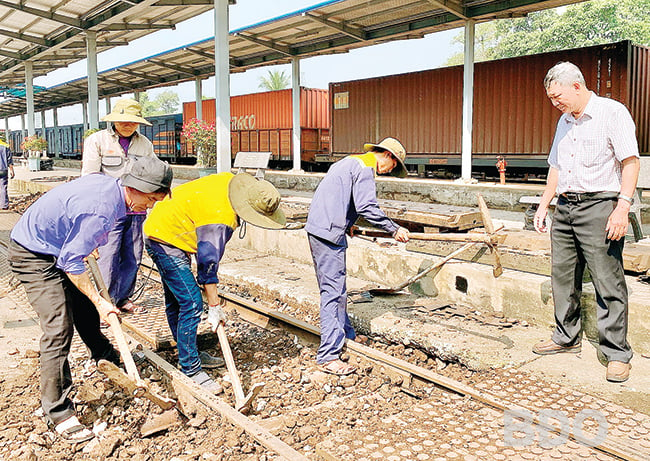 |
Mr. Nguyen Canh Nam (right cover, Captain of the Dieu Tri Bridge and Road Team) directs the maintenance activities of the railway section through Dieu Tri Station. Photo: NC |
The patrol team consists of railway workers who work without the concept of night, day, holidays, and Tet; every day they have to face pressure, loneliness and uncertainty. Each patrol team has 4 people, working in shifts with 3 shifts/day, each shift 8 hours. With a management route of more than 10 km, each time they "go to work" they have to walk more than 20 km alone. On average, they work 24 days a month, walking more than 500 km. If working continuously for 7 years, the distance that a patrol employee travels will be longer than 1 circle around the Earth.
With 32 years of “railway inspection”, Mr. Huynh Van Quyen (62 years old, Nhon Hau commune, An Nhon town) has walked more than 192 thousand km, or nearly 5 times around the Earth. He retired more than 10 years ago, but his memories of patrolling the tracks are still intact. Those were the hot summer afternoons, the rails were “burned” by the sun, expanding to their maximum, as if wanting to move and twist; the friction with the rail nails and rail tongs made dry sounds. In the hot sun and under the hot sun, his feet were blistered many times after patrolling through the afternoon. On stormy nights, he walked slowly, slowly, still straining his eyes to check each nail, each bolt. He really had to check each one, not leaving any out.
The indispensable item of a patrol officer is a tool bag worn on the side weighing nearly 5 kg with wrenches, lights, signal flags, books... Among them, there is something that no one wants to "touch" - a box of defensive fireworks - 6 pieces. However, Mr. Quyen had to use it. On a rainy patrol night more than 30 years ago, Mr. Quyen discovered that the railway section through Tan Hoa village (Cat Tan commune, Phu Cat district) had sunk, forcing him to "activate" the emergency defense mode. "You have to run at full speed towards the nearest oncoming train, when you are 800 m away, place 3 fireworks on 2 rails in a V-shape, in which the left rail in the direction of the incoming train has 2 fireworks, the other rail has 1 fireworks, each 20 m apart. Then stand back 20 m, use the red light to warn the oncoming train", Mr. Quyen recalled.
Inheritance, continuation
At the age of 43, Mr. Nguyen Van Thach (in My Chau commune, Phu My district) - 1 of 117 officers and employees of Bong Son Bridge and Road Team has 23 years of experience in the profession. Mr. Thach spent 5 years repairing roads before moving to guard Phu Cu tunnel (Km 1,026+850, 170.16 m long, connecting Phu My district and Hoai Nhon town. According to Mr. Thach, it is impossible to know exactly how many people have guarded the tunnel, but it is certain that at any time the tunnel must have someone guarding it. Currently, the tunnel patrol team has 4 people, working in shifts with the number of "1 day, 2 nights", each shift 12 hours.
“Every time a train passes, we check the tunnel and 100 meters of track outside both ends of the tunnel. We have to check every detail to promptly fix small errors, and in case of major incidents, we have to defend immediately. In 2017, the tunnel entrance at the north end collapsed, I ran 850 meters to place a defense gun, I still remember it to this day,” Mr. Thach shared - but the sadness and loneliness are what create the pressure!
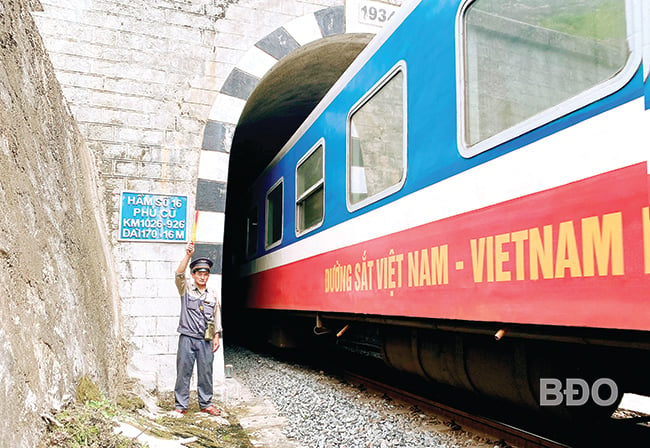 |
Mr. Nguyen Van Thach, Head of the Phu Cu Tunnel Patrol Team (Bong Son Bridge and Road Team) has been involved in the tunnel patrol work for over 10 years. Photo: NC |
For many employees of the Company, the job of protecting the railway is also a family tradition. For many years, Mr. Quyen has been the pride of his youngest brother, Huynh Van Hoa, 46 years old, a train guard at Km 1,080+420 (Nhon Hau commune, An Nhon town). The guard is near his home, so in his free time, Mr. Quyen often goes out to chat and reminisce with his younger brother about the old railway section he patrolled.
Both are gatekeepers, working more than 6 km apart on the railway section through Cat Hanh commune and Ngo May town (Phu Cat district), Mr. Truong Hong Tu (55 years old) and his son, Mr. Truong Thanh Toan (29 years old, both in the Dieu Tri Bridge and Road Team) are colleagues. Mr. Tu's family has been in the railway industry for three generations. In the years after liberation, Mr. Tu's father (who passed away in 2011) worked as a gatekeeper and then Deputy Head of Quy Nhon Station.
Mr. Tu confided that the job of guarding a level crossing seems simple but the responsibility is heavy. After listening to the on-duty phone and recording the train's arrival time, the crossing guard must keep a close eye on the train and vehicles on the road, keeping track of the time to lower the barrier, which must be in accordance with regulations, that is, not too early or too late, while also ensuring the safety of himself and the vehicles when closing the barrier.
“The most annoying thing is seeing people recklessly crossing the road when the barrier is down. Many times I was cursed at for blocking traffic when a train was approaching, and my heart was pounding when drunk people drove their vehicles into the barrier. Because of the nature of my job, I often tell my children to be careful and encourage them to try their best to do their job well,” Mr. Tu confided.
The railway protection activities in the province since the reunification have had the silent contribution of thousands of people, from many generations. Many people "drilled the road" persistently for several years, but there were also people who "surrendered" after only a few months because it was too hard. But there were also many people like Mr. Quyen, quietly patrolling the road for more than 30 years, while a rail after more than 20 years of service may have to be replaced because it was worn beyond the allowable limit. They - anonymous people - through many ups and downs still attached their lives to the railway according to the rules of the profession, when they were young they "drilled the road" as if to train themselves and when they started to mature, they switched to patrolling the road and guarding the crossing. And when they passed that threshold, everyone was proud of their profession, of the quiet steps protecting the safety of the train.
NGUYEN CHON
Source: https://baobinhdinh.vn/viewer.aspx?macm=1&macmp=82&mabb=355196


![[Photo] Many young people patiently lined up under the hot sun to receive a special supplement from Nhan Dan Newspaper.](https://vphoto.vietnam.vn/thumb/1200x675/vietnam/resource/IMAGE/2025/5/18/6f19d322f9364f0ebb6fbfe9377842d3)
![[Photo] Party and State leaders visit President Ho Chi Minh's Mausoleum](https://vphoto.vietnam.vn/thumb/1200x675/vietnam/resource/IMAGE/2025/5/19/d7e02f242af84752902b22a7208674ac)

![[Photo] Ready for the top competitions of Vietnamese table tennis](https://vphoto.vietnam.vn/thumb/1200x675/vietnam/resource/IMAGE/2025/5/18/9c547c497c5a4ade8f98c8e7d44f5a41)
![[Photo] Party and State leaders attend the special art program "You are Ho Chi Minh"](https://vphoto.vietnam.vn/thumb/1200x675/vietnam/resource/IMAGE/2025/5/18/6895913f94fd4c51aa4564ab14c3f250)



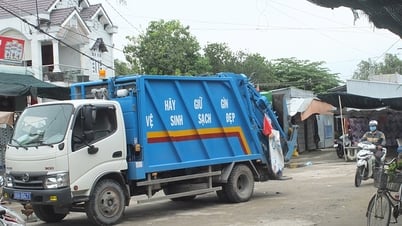

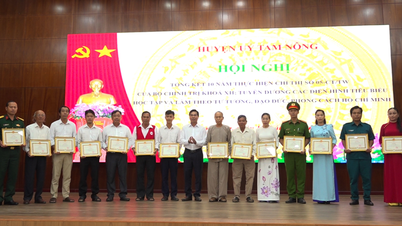





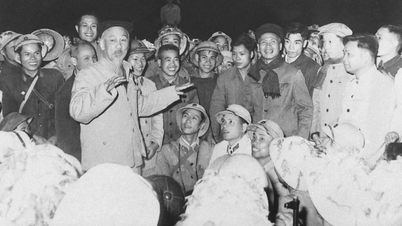





















































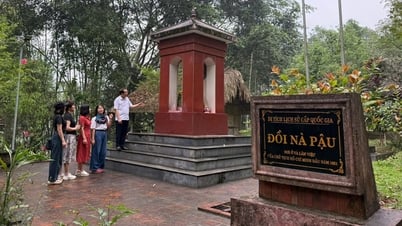


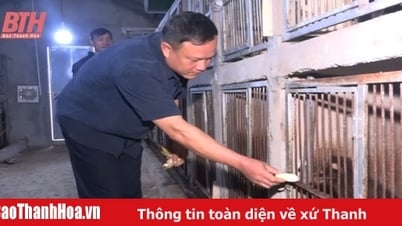










Comment (0)